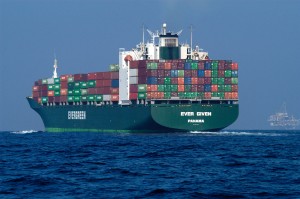 The Sabin Center for Climate Change Law has released a new white paper addressing state authority to regulate greenhouse gas emissions from ships. According to international law, all ships must have a nationality and must register with and fly the flag of that state. Flag state jurisdiction refers to a state’s authority to regulate ships within its registry. A SCCCL white paper published in February 2014, which addressed state authority to regulate greenhouse gases (GHGs) from the international shipping sector, concluded that flag states have broad authority under international law to regulate GHG emissions from vessels within their registry. This new white paper delves further into the issue of flag state authority to examine how registry structure may affect a state’s capacity to regulate.
The Sabin Center for Climate Change Law has released a new white paper addressing state authority to regulate greenhouse gas emissions from ships. According to international law, all ships must have a nationality and must register with and fly the flag of that state. Flag state jurisdiction refers to a state’s authority to regulate ships within its registry. A SCCCL white paper published in February 2014, which addressed state authority to regulate greenhouse gases (GHGs) from the international shipping sector, concluded that flag states have broad authority under international law to regulate GHG emissions from vessels within their registry. This new white paper delves further into the issue of flag state authority to examine how registry structure may affect a state’s capacity to regulate.
Many registries are structured such that the flag state has limited connection to or exercises limited control over registered vessels. For example, many states’ registries are “flags of convenience” (FOC), meaning flag states have only weak ties with ships registered under their flag. In addition, many flag states franchise their registries to private corporations that manage the registration of ships. This has led to concerns that the structure of a registry might affect a flag state’s ability to regulate. The paper assesses both legal authority and practical capacity of FOC states with franchised registries to promulgate GHG regulations. The paper concludes that while regulatory authority is not impaired by the structure, states may encounter practical obstacles to regulation. The paper offers potential strategies and solutions to these obstacles, such as regaining control of a franchised registry.
The report, entitled Flag State Regulation of Greenhouse Gas Emissions: Regulatory Authority of Flags of Convenience and Franchised Registries, was written by SCCCL summer intern Alyssa Kutner and previous SCCCL fellow Meredith Wilensky.

